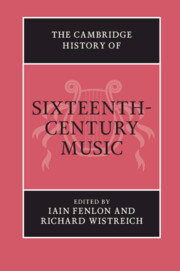Book contents
- The Cambridge History of Sixteenth-Century Music
- The Cambridge History of Music
- The Cambridge History of Sixteenth-Century Music
- Copyright page
- Contents
- Maps and Figures
- Notes on the Contributors
- Acknowledgements
- Abbreviations
- Maps
- Introduction
- Part I Confessions, Identities, and Rhetorics of Power
- Part II Culture, Place, and Practice
- Part III Institutions, Ideas, and the Order of Nature
- 10 Institutions and Intellectual Life
- 11 Music Theory and Pedagogy
- 12 Music, Science, and Philosophy
- 13 Music and Magic
- Index
- References
10 - Institutions and Intellectual Life
from Part III - Institutions, Ideas, and the Order of Nature
Published online by Cambridge University Press: 08 January 2019
- The Cambridge History of Sixteenth-Century Music
- The Cambridge History of Music
- The Cambridge History of Sixteenth-Century Music
- Copyright page
- Contents
- Maps and Figures
- Notes on the Contributors
- Acknowledgements
- Abbreviations
- Maps
- Introduction
- Part I Confessions, Identities, and Rhetorics of Power
- Part II Culture, Place, and Practice
- Part III Institutions, Ideas, and the Order of Nature
- 10 Institutions and Intellectual Life
- 11 Music Theory and Pedagogy
- 12 Music, Science, and Philosophy
- 13 Music and Magic
- Index
- References
Summary
- Type
- Chapter
- Information
- The Cambridge History of Sixteenth-Century Music , pp. 381 - 413Publisher: Cambridge University PressPrint publication year: 2019

